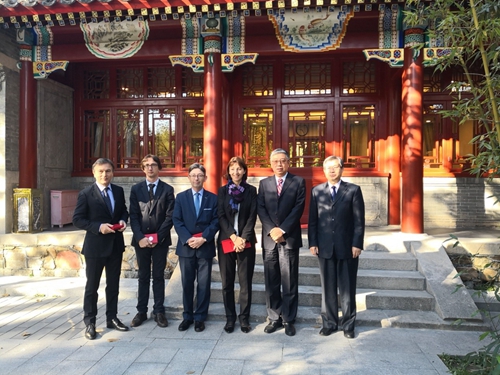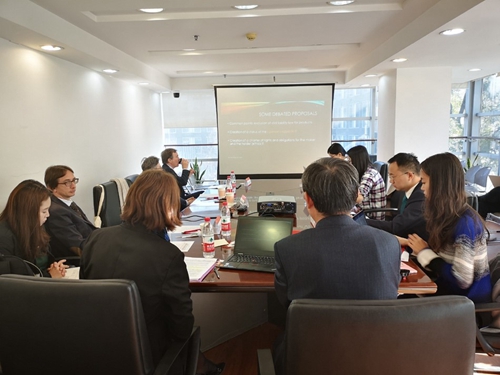“Workshop on AI Related Legal Issues”was Successfully Held
Date:2018-11-23
On the morning of October 31, 2018, the "Workshop on AI Related Legal Issues" seminar of the 2018 series of the Intellectual Property Law and Technology Law of Peking University was successfully held in Chenming Buiding, Peking University. The seminar was hosted by Peking University Law School and Peking University Science and Technology Law Research Center and was hosted by Professor Liu Yinliang, Director of the Science and Technology Law Research Center of Peking University. Professor Alexandra Mendoza-Caminade, Vice President of the University of Toulouse, France, Professor Philippe Nelidoff, Dean of the School of Law, Professor Jacques Larrieu, Law School, and Professor Florent Garnier, Joint Research Institute, and Professor Jiang Su, deputy director of the Center for Law and Artificial Intelligence at Peking University, Xu Huili, a Ph.D. student at Peking University Law School, and Zheng Shufeng, a Ph.D. student at Peking University Law School, participated in the conference. The conference also attracted more than 10 doctoral and master students from Peking University Law School and other institutions to participate in the audition and discussion.
Before the seminar, Prof. Tian Gang, Vice President of Peking University and officials of Peking University International Cooperation Department met with members of the Toulouse First University delegation in Linhuxuan.

The meeting was first introduced by Professor Liu Yinliang and welcomed the experts and scholars visiting the University of Toulouse. Professor Gao Mengshan expressed his desire to cooperate with universities in China and other countries in the field of artificial intelligence. He hopes to increase his understanding of artificial intelligence related issues through this seminar. Professor Jacques Laxue first explored two issues related to author rights in the development of artificial intelligence. The first question is whether the concept and scope of author rights will be altered by artificial intelligence. He pointed out that according to the traditional legal principles of creativity and originality, it is difficult to judge whether the author of the artificial intelligence generated work is a programmer, a data provider, a user or an artificial intelligence owner. Regardless of the type of subject, the rights of the rights holder are limited. The second issue is the impact of data mining on copyright. Machine learning technology in artificial intelligence relies on data mining and needs to provide a large amount of data, which involves the interests of data copyright owners. In order to promote the development of artificial intelligence technology, the relevant provisions of the French and EU intellectual property systems are being adjusted. As a whole, the author's privilege will gradually be limited by the demand for machine learning.
Professor Gao Mengshan then discussed the issue of artificial intelligence and its tort liability. She pointed out that the essential concept of artificial intelligence is still very vague, but artificial intelligence is already autonomous. How to regulate the risk of infringement in the process of machine independent decision-making is a complicated and controversial issue. There is a guardian system in the French Civil Code, but because in the case of AI, the guardian loses control of the machine and the system is difficult to apply in the field of artificial intelligence. The current rules do not apply. Do you need to consider new rules? Some scholars have proposed to give artificial intelligence the right and obligation to regard it as an animal or a minor; some reports in the EU also propose an electronic personality that recognizes artificial intelligence. The current legal system cannot solve these problems, and future legal workers are still facing more problems to be solved, and hope to find answers through cooperation.

Seminar site
Professor Jiang Su traces the situation of artificial intelligence and legal development in China. He believes that in China, the impact of artificial intelligence technology on the law is mainly reflected in two dimensions. The first dimension is the application of artificial intelligence technology. At present, legal workers such as legislators, judges, prosecutors and lawyers are already using artificial intelligence technology to assist their work. In the future, artificial intelligence applications and artificial replacement capabilities will be further expanded and improved. . The second dimension is about the issue of artificial intelligence legal issues, such as the right to ownership of artificial intelligence products in intellectual property law, and the issue of tort liability of automated machines. In addition, legal issues related to artificial intelligence include personal data rights, and criminal regulations when technicians use artificial intelligence to conduct cyber attacks. He pointed out that when discussing the legal issues related to artificial intelligence, it is necessary to pay attention to three points: First, the regulation of artificial intelligence should not only consider the legal system, but also combine it with ethical rules; second, when legal regulation of artificial intelligence is conducted, the traditional legal system should not be completely abandoned. New solutions should be found on the basis of traditional legal systems and legal principles. Third, the process of regulating artificial intelligence should pay attention to the balance between innovation and security, while encouraging the development of artificial intelligence technology. Adhere to the principle of giving priority to human interests.
PhD student Xu Huili discussed her understanding of artificial intelligence legal personality. By showing the process of creating poems by Microsoft's "Little Ice" robot, she pointed out that artificial intelligence technology has evolved from a pure tool to a creator who can independently generate works. Whether Xiao Bing can obtain the copyright of a work depends on whether artificial intelligence can have legal personality. At present, some scholars have proposed a variety of artificial intelligence to obtain legal personality, such as corporate personality, limited personality, instrumental personality, electronic personality. However, more scholars disagree that artificial intelligence does not have the ethical basis of intentionality, free will and legal personality, and that giving legal personality may bring unpredictable risks to civil law system and even human society. She believes that artificial intelligence can be given a special type of legal personality based on the priority of security, safety and efficiency.
During the discussion session, the Ph.D. students and master students at the conference were very enthusiastic about the fears brought about by new technologies, the spiritual rights of machines, the rights related to artificial intelligence entering the public domain, how traditional laws explain new problems, and whether they can use market substitution theory to distinguish between the ideas and expressions in the copyright law, and they had deep discussions with the present scholars. Finally, Professor Liu Yinliang made a concluding speech and expressed his gratitude to the participants. He hoped to strengthen cooperation with research institutions such as Toulouse I University in this field and exchange gifts with visiting experts from Toulouse I University.
After the seminar, the participating experts and some students visited the campus and took a group photo.

Participants and some students took a group photo
Translated by: Huang Lianggui
Edited by: Zhu Mengyuan



